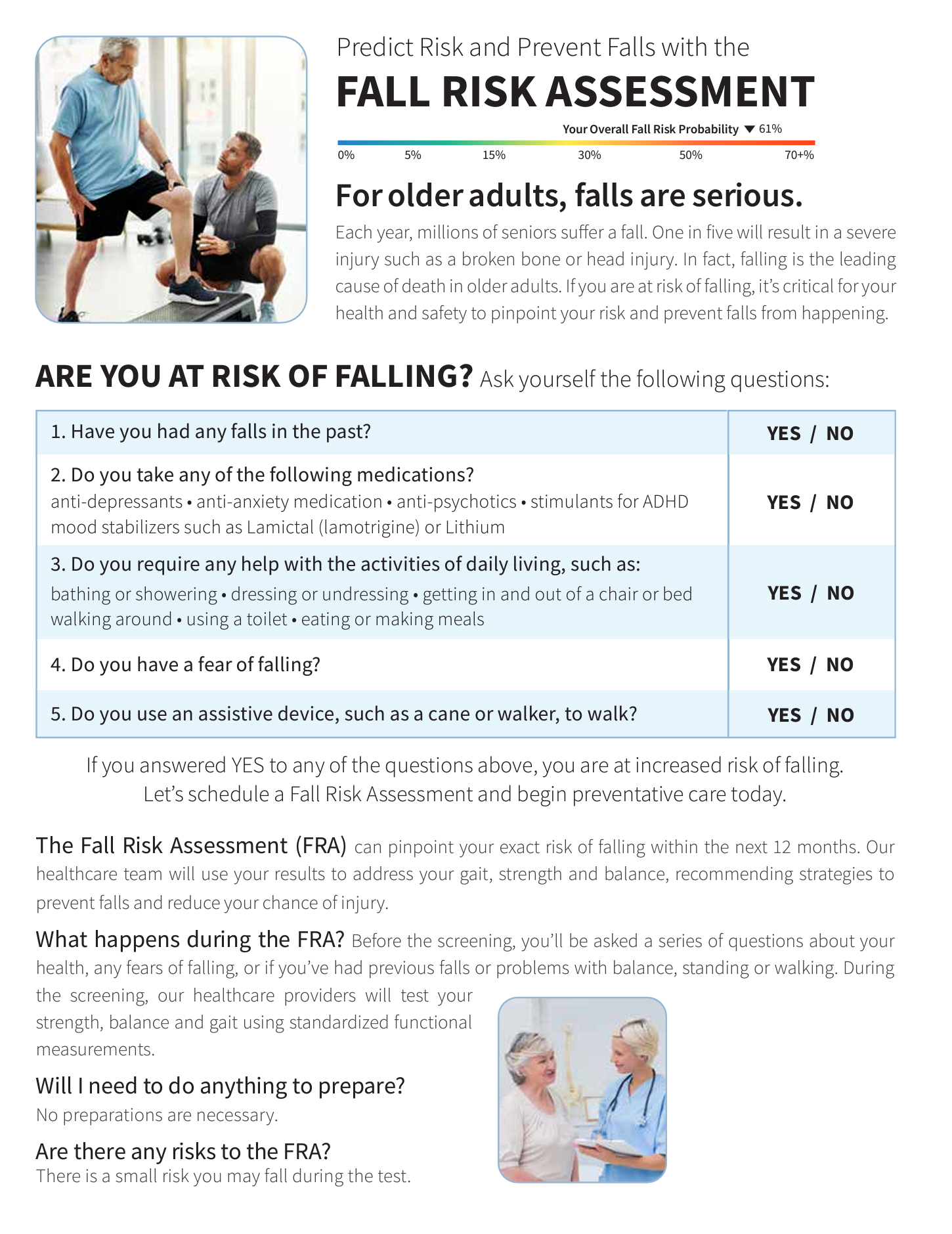What Does Dementia Fall Risk Do?
What Does Dementia Fall Risk Do?
Blog Article
The Greatest Guide To Dementia Fall Risk
Table of ContentsHow Dementia Fall Risk can Save You Time, Stress, and Money.Dementia Fall Risk for BeginnersThe Of Dementia Fall RiskDementia Fall Risk - QuestionsThe 6-Second Trick For Dementia Fall Risk
You could be anxious because you've had a fall before or because you have actually observed you're beginning to really feel unsteady on your feet. You could have seen changes to your health, or just seem like you're reducing a little. Whatever the factor, it isn't uncommon to come to be cautious and shed confidence, and this can stop you doing the important things you used to do and make you really feel extra separated.If you have actually had a fall or you've begun to feel unstable, tell your doctor also if you feel great otherwise. Your doctor can examine your balance and the way you walk to see if renovations can be made. They might have the ability to refer you for a falls risk analysis or to the drops prevention solution.
This info can be acquired with interviews with the individual, their caretakers, and a review of their clinical documents. Begin by asking the individual concerning their background of falls, consisting of the regularity and scenarios of any type of current falls. Dementia Fall Risk. Inquire regarding any type of movement issues they may experience, such as unsteady or trouble strolling
Conduct a complete review of the person's medicines, paying certain focus to those recognized to boost the danger of falls, such as sedatives or drugs that lower high blood pressure. Establish if they are taking several drugs or if there have actually been recent changes in their drug regimen. Assess the person's home environment for prospective threats that can increase the threat of drops, such as poor illumination, loosened carpets, or absence of grab bars in the shower room.
Dementia Fall Risk - The Facts
Guide the person through the fall risk assessment kind, clarifying each inquiry and recording their feedbacks precisely. Guarantee that the specific comprehends the function of the assessment and feels comfy providing honest answers. Determine the complete threat score based upon the feedbacks provided in the evaluation form. Determine the person's risk group (low, tool, or high) based on the complete rating and the presence of automated risky status factors.
Consistently keep track of the individual's progress and reassess their threat of falls as needed. Provide ongoing education and assistance to advertise safety and reduce the risk of drops in their day-to-day living activities.
Several researches have actually shown that physical treatment can aid to lower the threat of dropping in grownups ages 65 and older. In a brand-new research study (that took a look at drops danger in women ages 80 and older), scientists determined the economic effect of choosing physical treatment to stop falls, and they located that doing so saves $2,144, including all the covert prices of your time, discomfort, missed out on life occasions, my explanation and the bucks spent for solutions.
Some Known Incorrect Statements About Dementia Fall Risk
Inspecting your heart price and high blood pressure measurements at rest and while you turn (from sitting or lying to standing). A basic test of your thinking (cognitive) capabilities. Examining your balance, toughness, and strolling capacity. An easy vision examination. Assessing your feet and shoes. A home safety assessment. Based upon the assessment results, your physical therapist will develop a strategy that is customized to your details needs.
Older grownups who have difficulty strolling and talking at the same time are at a higher danger of dropping. Dementia Fall Risk. To help increase your safety and security during daily tasks, your physical specialist may create a training program that will test you to preserve standing and walking while you do an additional task. Instances consist of strolling or standing while counting in reverse, having a conversation, or carrying a bag of grocery stores
Your physical specialist also can determine which activities you ought to prevent to remain secure. Community-based falls avoidance programs assist individuals to: Decrease their concern of dropping. Establish objectives for increasing their exercise. Make their homes safer. Work out more to enhance their stamina and balance. These programs frequently are led by volunteer trainers.
Not known Details About Dementia Fall Risk

Measles, or rubeola, is a very transmittable, acute viral contagious condition brought on by the measles infection. Some individuals believe of measles as just a rash and fever that cleans up in a few days; nonetheless, measles can cause major health and wellness difficulties, especially in children more youthful than 5-years-old. The most effective defense versus measles is the measles, mumps, and rubella (MMR) vaccination.
Loss are an usual click cause of injury among older grownups. According to the CDC, in one year alone, fall-related injuries added to over $50 billion in medical costs (Dementia Fall Risk). In health center setups, older adults go to especially high risk of falls because their reduced wheelchair from being restricted to a room or bed.
About Dementia Fall Risk

She has a case history of seizure disorder and high blood pressure. She is getting an IV mixture and taking Gabapentin and Lasix. She has no background of falls, her gait is constant, and she invalidates without concerns. The previous nurse states that she calls for assistance to the bathroom when she needs to go.
Examples of typical loss interventions/measures consist of: Making certain an individual's important items are available. Putting the individual's bed rails up with the alarm on. Assisting an individual while they're rising from bed. Past recognizing just how to use the Johns Hopkins Fall Threat Analysis Tool, it is very important that facilities integrate its use right into a much more thorough fall prevention strategy.
Report this page